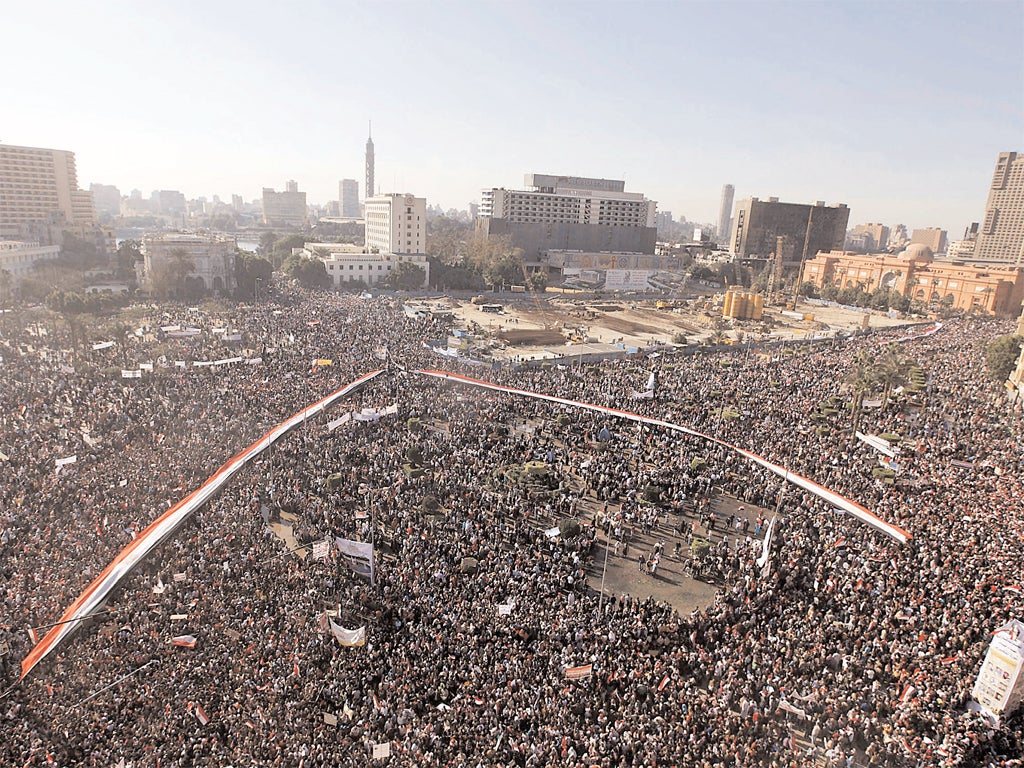
Your support helps us to tell the story
From reproductive rights to climate change to Big Tech, The Independent is on the ground when the story is developing. Whether it's investigating the financials of Elon Musk's pro-Trump PAC or producing our latest documentary, 'The A Word', which shines a light on the American women fighting for reproductive rights, we know how important it is to parse out the facts from the messaging.
At such a critical moment in US history, we need reporters on the ground. Your donation allows us to keep sending journalists to speak to both sides of the story.
The Independent is trusted by Americans across the entire political spectrum. And unlike many other quality news outlets, we choose not to lock Americans out of our reporting and analysis with paywalls. We believe quality journalism should be available to everyone, paid for by those who can afford it.
Your support makes all the difference.You can get almost anything you want in Tahrir Square these days: corn-on-the-cob, suitcases, a cheap holiday in Sharm el-Sheikh, eggs, empty tear-gas cartridges and lots and lots of arguments and heaps of banners extolling the courage of martyrs and the evils of policemen. There are still a few thousand there every day – today, the revolutionaries are calling for another million – but the many more millions who queued to vote on Monday and Tuesday have put Tahrir Square's integrity in doubt.
Who represents Egypt now? The young and secular revolutionaries in Tahrir or the growing list of successful Islamist candidates – Muslim Brotherhood and, surprisingly, an increasing number of Salafists – with their millions of votes? Certainly not Field-Marshal Mohamed Hussein Tantawi, Egypt's military ruler. He glowers down critically from many a Tahrir poster. He must get rid of his silly baseball-style cap and wear a soldier's beret like the rest of his men. And every morning, I hope he gets out of bed and says three times: "I was not elected. I was not elected. I was not elected."
For that's the point, isn't it? Tahrir wasn't elected. Nor was Tantawi.
You can canvass a thousand views on Tahrir. There will be a big uprising here, I'm told at a medical tent. There will be a titanic struggle between a newly elected parliament and the Military Council, unless, of course, the Brotherhood have done a secret deal with the army, so that Tantawi can rule as a closet Mubarak, the Great Father Figure who will escape all civilian control by allowing the Islamists to flounder away in government in return for lèse-majesty privileges, an Algeria-like "pouvoir" above the "pouvoir".
In Tahrir, it's easy to be cynical. But don't forget that the protesters have now even collected another clutch of martyrs: 42 in all, blasted away by snipers and cops last month with an unusual, more suffocating tear-gas and birdshot into the eyes of demonstrators. Forty-nine young people lost eyes and the boulevard which leads to the Interior Ministry has already been renamed the "Eyes of Freedom Street".
The old Tahrir of January and February is now more a memory than an inspiration. It's recognisably the same place; the great old apartment blocks and the wicked, concrete Soviet-era Mugamma Building – a grey despair-all-ye-who-enter-here tombstone of bureaucracy that the Egyptian revolution shut down – and the rose-pink Egyptian museum and the hulk of the old Hilton and Farouq's ancient foreign ministry. But the flowering of young courage, the defeat of the cops and their drug-addled "baltagai" thugs in February, the everyone-suddenly-burst-out-singing joy of Mubarak's overthrow, has ended up in the pit of all revolutions. Hopes betrayed, parties hijacked, cops back on the streets. I remember a woman telling me back then that: "All we want is the departure of Mubarak," and I said surely she means the system as well, but somehow Tahrir – back then – aimed only at Mubarak and the army were their heroes and all would be well in the best of all possible worlds. The people won. The dictator fell. Long live free Egypt. And then it turned out Mubarak had not turned his rule over to the president of the constitutional court – as the 1971 Egyptian constitution says he should have – but to his old chum, Tantawi, and the 19 other generals.
And Tantawi kept appointing or approving more Mubarak chums, not least the latest Prime Minister, Kamal el-Ganzouri, who had been a Mubarak prime minister; a government of the unelected, some of them very elderly, would now "guide" Egypt's revolution; old ruling young. It seems incredible that the Military Council should have arrested so many since the revolution; that so many should have been tortured; that the army would begin virginity tests for arrested women.
Wissam Mohamed, a 26-year old translator completing a masters in political science, says she's still a revolutionary and believes that the Military Council will not hand over power without further demonstrations by "the people".
She mourns the fact that so many of the dead and wounded last month were young and from such poor families. She senses that Mubarak, the farmer Mr Smith of Orwell's 1984, has not really gone. "Mr Smith never left," she says. "They might well put him back in the palace."
Join our commenting forum
Join thought-provoking conversations, follow other Independent readers and see their replies
Comments